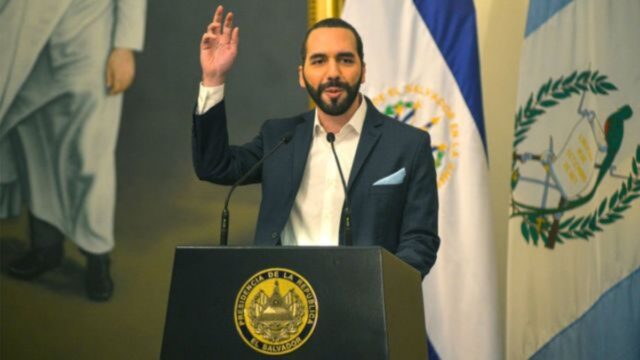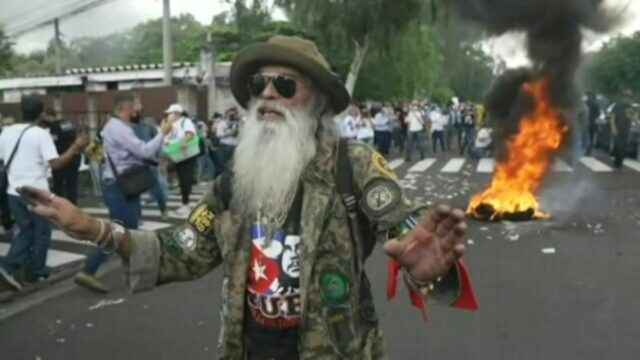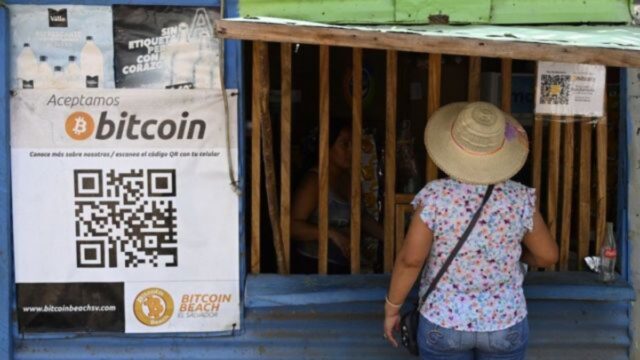Three dollars a day, when she is lucky, is what Francisca Rivas manages to collect by selling in a popular market in the north of San Salvador. With that, less than US $ 100 a month, she must support her three granddaughters, ages 12, 9 and 4.

“We are poor people who spend (live) with the coins that fall to us every day,” she says sitting on a wooden stool inside her modest grocery store. The little more than two square meters of that room are dark, compact and almost invisible in a place where two hundred other small merchants received with skepticism on Tuesday the possibility of receiving payment for their services in bitcoin.
Since this September 7th, El Salvador becomes the first country in the world in which this cryptocurrency is legal tender. Francisca’s seven and a half decades of hard life can be read on her face, on her work-worn hands: a scroll with stories of lack and abandonment written in every furrow of her skin.
“That pisto does not suit us, because it will lead us further into poverty,” she says, and takes a sip from her cup of coffee. By “pisto” she refers to bitcoin, the cryptocurrency promoted by the government of President Nayib Bukele. As of this Tuesday, it is legal to make payments through a digital purse (wallet) installed on a cell phone.
One of Francisca’s biggest fears is that those US $ 3 she takes home every day will be reduced and she senses that this will happen when she must refuse to make a sale to someone who, phone in hand, wants to pay in bitcoin. “If we don’t have a device like that, bitcoin is not for us poor people,” she says.
First day as legal currency
With the entry into force of the law for the use of bitcoin, El Salvador becomes a world laboratory of cryptocurrency. Under an atmosphere of rejection, confusion and uncertainty, President Bukele dedicated the first hours of the day to publicize the launch of the controversial measure on his social networks. Hours before, Bukele confirmed the purchase of 200 new cryptocurrencies, with which the total amount acquired by the Salvadoran government amounted to 400 units of the digital currency.

Since that acquisition, the value of bitcoin began a rapid decline, the steepest in a month, with which some analysts estimate the losses of the government of El Salvador at close to US $ 1 million. And that just 12 hours after the start as the official currency in the country.
That was not the only stumbling block in the official debut of bitcoin in El Salvador. Although the government promised that its digital wallet, Chivo App, would be valid from the first minute of this past Tuesday, that did not happen.
The Bitcoin Law makes El Salvador the first country in the world to adopt cryptocurrency as a legal tender on Tuesday. At noon, the application download was only available on Huawei-branded mobiles and it was not possible to do so on phones with Android or iOS operating systems.
Bukele himself had to apologize for the delay and even demanded that Google and Apple stores speed up the launch of the application, which sparked debate on whether or not the software programmed by the Salvadoran government meets the security requirements that both companies require the products to be downloadable on their platforms.
To this were added complaints on social networks from users who managed to download the application and access the US $ 30 that the government offers for the use of its official app, reporting that they did not receive the exact amount due to the collection of commissions and fluctuations in the currency value.
The fifty specialized booths for bitcoin transactions looked almost desolate throughout the morning, reviving the debate about the cost that the construction of those spaces implied versus the utility they will have. Much of the population still does not know how cryptocurrency works.
“Like all innovation, the bitcoin process in El Salvador has a learning curve. Every road to the future is like this and not everything will be achieved in one day, not one month,” Bukele said on Twitter Monday.
Francisca is a merchant who makes US $ 3 a day and fears the arrival of bitcoin. And she was able to corroborate that, outside of large service chains, medium and small businesses, in addition to informal businesses, are far from being fully prepared to carry out transactions with bitcoin.
“I felt very insecure about putting my money in this application, there is no guarantee of a clean purchase”, says the user, after some establishments started the process and had to stop it or even try to reverse it when there was no clarity in any of the the steps.
In small or informal businesses, the possibility of buying through the Chivo App was impossible. “If you are going to buy me, buy me in dollar; if not, I will not sell to you,” was the response of Reyna García, a merchant from the Historic Center of San Salvador who also expressed a fear that is recurrent among the Salvadoran population:” That it will leave more poor people.”
The critics
Reyna’s fear is common in El Salvador. The little information released by the government created a climate of uncertainty that increased as the date for the law to come into force approached, which was approved by the Legislative Assembly controlled by President Bukele’s party.
There were 90 days of contradictions by official spokesmen and Bukele himself about the obligation to accept payments with the new currency and even with threats of sanctions to those who do not accept it.
There are fears about whether bitcoin can serve to cover money laundering crimes and doubts about the origin of the funds for the implementation of the project, about the absence of clear rules and about the possible effect on the poorest population and with less access to digital technology.
The anger of certain sectors for bitcoin adds to the protests over the recent decisions of the ruling party. In recent weeks, the dismissal of constitutional prosecutors, judges and magistrates was approved and the door was opened for Bukele’s re-election, something that the country’s Constitution prohibits. For this reason, hundreds of Salvadorans marched this Tuesday in protest through the streets of the Salvadoran capital.
All while the market speculation, to which the value of bitcoin is subjected, causes losses in the investments of the government, which insists on the promise of effectiveness of the economic measure. Despite the cryptocurrency crash, Bukele announced the purchase of 150 more units of bitcoin for a net total of 550 units.
The unpopularity of Bukele’s new economic measure is also beginning to be reflected in opinion polls, such as the one recently published by the José Simeón Cañas Central American University (UCA) in which the economy ranks as the second problem that most affects Salvadorans .
The survey reveals that at least four out of ten Salvadorans believe that the country’s economy will worsen with the entry into force of the cryptocurrency and more than 66% believe that the Legislative Assembly, in the hands of President Bukele’s party, should back down and repeal that law.
According to the survey, nine out of ten Salvadorans have no clear knowledge of what bitcoin is or how it works. “We don’t know anything, the president didn’t explain anything or ask if we wanted it. I would have said no, ”says Elba Santos, a merchant who sells her products on the outskirts of San Salvador.

“If I don’t even know it, how am I going to accept it,” says Elba, who says that together with another group of small merchants she sought out local authorities to receive training or information before the cryptocurrency came into effect. And says that she got no response.
“As sellers we are frustrated,” she confesses, and confirms that in her business she will not allow payments that are not made in dollars, the official currency of El Salvador. That is also the opinion of Osmin Crespín, a fruit and vegetable trader, who considers that the biggest losers from the start-up of bitcoin as legal tender will be small merchants. “I would tell him to worry about poor people, as he promised,” the seller complains to Bukele, who joins the broad sector of small merchants that at the moment is reluctant to accept payments with bitcoin.

